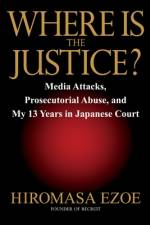av Hiromasa Ezoe
321
On June 19, 1988, the Asahi Shimbun newspaper broke the story: Recruit Co. Ltd., a media conglomerate founded by Hiromasa Ezoe, was alleged to have bribed the deputy Mayor of Kawasaki City. Thus began what became known as the Recruit Affair, a scandal that shook Japanese politics to the core, just at the height of the Bubble Economy and brought down the long-entrenched Liberal Democratic Party and the government of Prime Minister Noboru Takeshita.As the other mainstream newspapers also began reporting on seemingly-suspicious stock transfers by a Recruit subsidiary to bureaucrats and prominent politicians, an angry public turned on founder and President Ezoe, setting him up as the villain, although the transactions were, actually, legal. Soon, Ezoe was detained by the Tokyo District Public Prosecutors Office, and harshly interrogated. There was no concrete evidence against Ezoe, but the sensational reports in the newspapers, TV new programs, and weekly magazines fanned the public's fury and encouraged the prosecutors to pressure a confession out of him. Ultimately, many top LDP politicians were linked to the scandal, and the Takeshita cabinet quit en masse the following year. Mentally and physically exhausted, Ezoe signed the interrogation records. He was given a suspended sentence, and resigned from the business he had founded as a Tokyo University student.Where is the Justice? is Hiromasa Ezoe's detailed and candid look at the Recruit Affair and the part he played in it. More than that, however, it is a sharp indictment of what the Los Angeles Times called, "the pervasive political dishonesty and rampant profiteering at the heart of the system..." Many experts on contemporary Japanese politics say that, in retrospect, the Recruit Affair was a significant turning point in Post-War Japan, as the Bubble Economy became the Lost Decade. Ezoe offers a unique perspective on these events, from which we, today, can draw important lessons about ethics, accountability, transparency, and the often dangerously entwined roles of policy makers, policy enforcers - and those who report and manipulate public opinion.





















